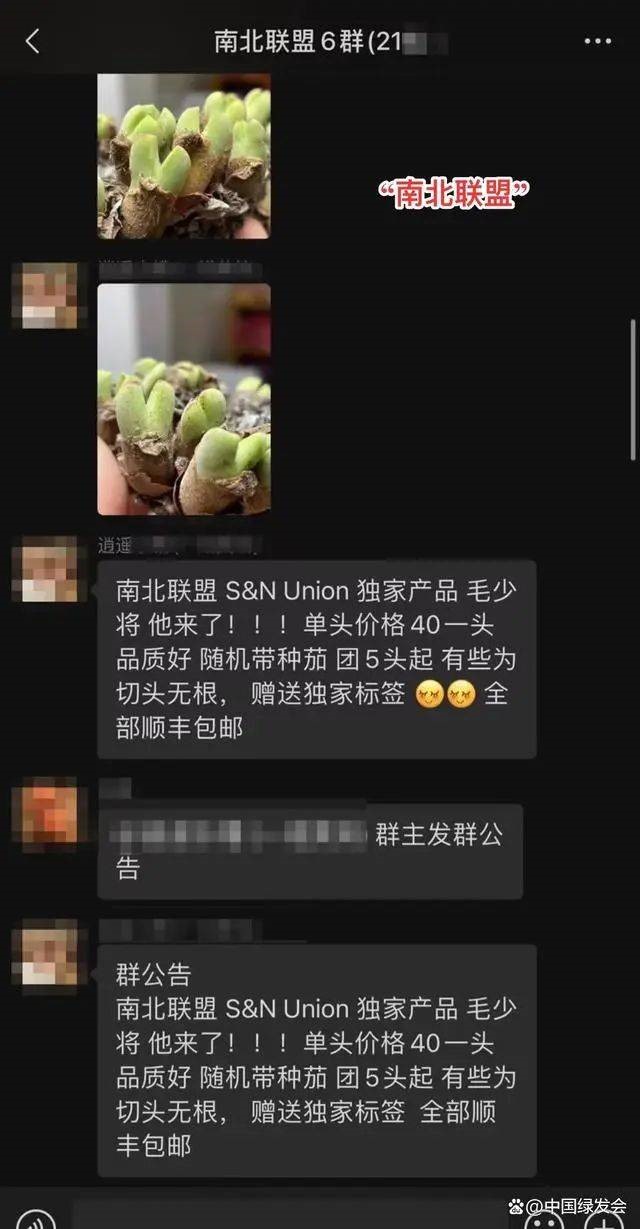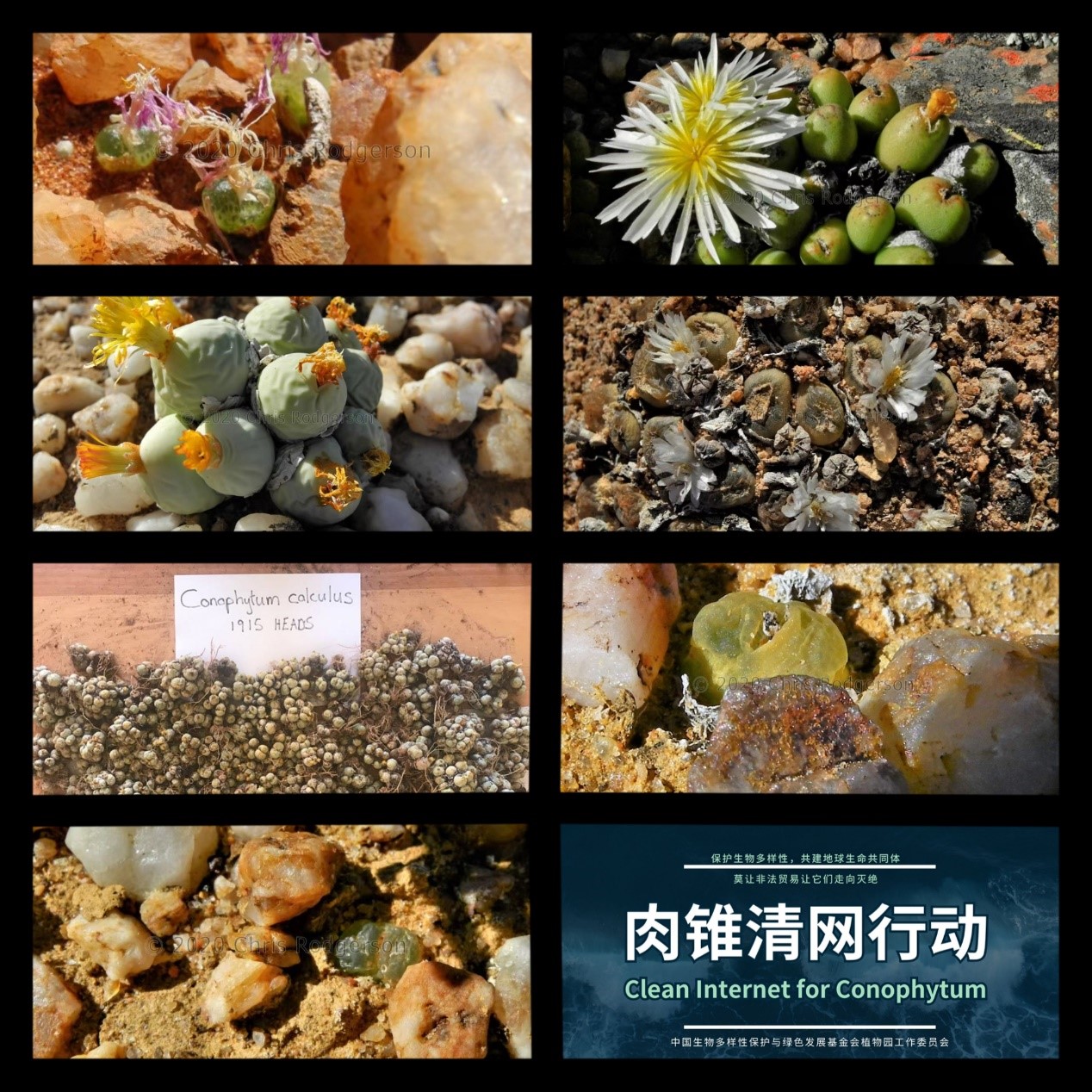On April 18, 2023, the China Biodiversity Conservation and Green Development Foundation (CBCGDF) filed an Environmental Public Interest Litigation to protect wild Conophytum plants with Nanjing Intermediate People’s Court of Jiangsu Province, and the litigation has been officially registered.
Loss of biodiversity is a serious environmental challenge faced by the world, and organized wildlife crime is one of the main reasons behind it, driven by huge profits. Conophytum are succulent plants distributed only in South Africa and Namibia, and are popular due to their unique appearance and bright colors. However, due to the scarcity of wild Conophytum plants and the existence of illegal harvesting and trade, these plants are under serious threat of extinction, and some species have already gone extinct in their natural habitats.
According to the notice of acceptance (document number: 2023 Su 01 Min Chu 1561) issued by the Nanjing Intermediate People's Court in Jiangsu Province, China Biodiversity Conservation and Green Development Foundation's litigation against Chen Qing and his Lulu Succulent Planting Cooperative has been received and accepted. After review, the litigation meets the legal requirements for acceptance, and the court has decided to hear the case.
During the "Clean Internet for Conophytum" campaign launched by CBCGDF, evidence and materials submitted by multiple whistleblowers showed that Chen Qing, also known as "Dr. Flower", is a suspect in an organized crime gang called “South & North Union”. Chen Qing's name appeared on the list of illegal wildlife plant traders caught by the South African police in 2019. The illegal harvesting and interception of wild plants in 2019 directly alarmed the Chinese Embassy in South Africa and prompted the embassy to issue a notice urging people who travel to South Africa not to collect local wild plants.

The picture by the South African police shows that in 2019, a group of people (CHEN QING, FAN YANG, ZHENYU LU) were detained and fined in South Africa for illegal mining of succulent plants.

Picture above: According to several whitleblowers who reported to Clean Internet for Conophytum, there is a "S & N Union" that sells wild succulents harvested from illegal source all year round. It is known to be a suspected major organized wildlife crime group that has led to the local extinction of some Conophytum in South Africa. They hire local people to harvest the plants and made huge profits. As the name implies, the S & N Union consists of the South and the North. Chen Qing is the "S" of the group - he is the big trafficker in the South. The suspects in the North, for the time being, have not had enough evidence to file charges though. Source: whistleblower sent to CBCGDF-CIC
This lawsuit, filed to protect endangered plants against the suspect of the crime, involves environmental damage caused by cross-border wildlife crime and is the first type of Environmental Public Interest Litigation initiated in response to Chinese leaders' calls to "protect biodiversity" and "build a community of shared future for all life" after the implementation of China's Environmental Protection Law in 2015.
China's Environmental Protection Law encourages grassroots environmental governance and encourages Chinese social organizations to sue environmental offenders to safeguard public interests (Article 58 of the Environmental Protection Law). In the definition of "environment" (Article 2), Conophytum and their natural habitats are also included in the scope of environmental protection.

A poster by the CIC.
【About CBCGDF】
The China Biodiversity Conservation and Green Development Foundation (CBCGDF) was founded in 1985, originating from the gift of endangered species Milu (Elaphurus davidianus) from the Duke of Bedford in the UK to China. To welcome the return of the deer, three then vice-chairpersons of the National Committee of the Chinese People's Political Consultative Conference (CPPCC) initiated the establishment of the "China Milu Foundation." Later, when the United Nations began negotiations on the Convention on Biological Diversity (CBD), scientists from the organization served as scientific advisors to the Chinese delegation. After the CBD was signed, the organization changed its name to "China Biodiversity Conservation Foundation." In the early 21st century, "green development" became a new theme of the times, so in 2019, it was renamed again as the "China Biodiversity Conservation and Green Development Foundation". CBCGDF has been recognized for its unwavering commitment to environmental protection and perseverance, and was selected as one of the "Top Ten Chinese News Figures" by the China Newsweek magazine in 2021.
Previously, in 2015, CBCGDF initiated China's first environmental public interest lawsuit to protect endangered plants. At that time, there was a planned hydroelectric power station in Sichuan, and its planning proposal could potentially damage the habitat of an endangered plant species Acer Pentaphyllum (Five-Leaved Maple).
【About Clean Internet for Conophytum (CIC)】
Clean Internet for Conophytum (CIC) is a natural conservation initiative launched by the China Biodiversity Conservation and Green Development Foundation (CBCGDF), aimed at combating illegal wildlife trade, particularly transnational poaching and illegal Conophytum trade, by purifying online trading platforms. The goal is to protect biodiversity and build a global community of life. The campaign was launched on March 9th, 2023 and has received support and participation from the public, conservationists, horticulturists, and businesses.
Starting from March 2023, CIC has been widely collecting clues about illegal Conophytum trade, including evidence and clues from wild Conophytum sellers on social platforms such as e-commerce platforms and social networks both domestically and internationally. The actions of these sellers have damaged the environment, violated environmental protection laws in China and South Africa, and affected human survival and sustainable development. It is because of the illegal poaching behavior of poachers that all species of Conophytum have been listed under Appendix III of CITES. In order to build a global community of life, we are preparing to file an environmental public interest lawsuit. CBCGDF welcomes volunteers and informants to contact the "China Wildlife Rescue and Scientific Ethics" working group and promises to strictly protect the information of whistleblowers. Please contact us at 010-88431370 or v90@cbcgdf.org.
Reporter: Wendy
Editor: Victoria
Contact: v10@cbcgdf.org; +8617319454776

Contribution
Do you know? CBCGDF is a non-profit organization. We rely on crowd-funding and donations. You have the opportunity to help us to advance biodiversity conservation. Donate TODAY to power up the movement to make it a better world for all life.
https://www.paypal.me/CBCGDFChina
http://www.cbcgdf.org/English/ConfirmDonaTion/0.html
